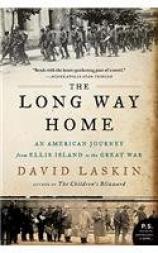Reading Group Guide
Discussion Questions
The Long Way Home: An American Journey from Ellis Island to the Great War

1. Here in the U.S., the First World War is often called the "forgotten war," overshadowed by the Civil War before it and the Second World War just a generation later. Discuss how The Long Way Home altered and informed your understanding of this chapter of American history. Compare the American experience in the Great War to that of Britain, France and Germany.
2. Laskin structures his narrative as a series of overlapping stories of 12 men. Did you find this an effective way of capturing the immigrant experience in the war? How successfully do think the book balances the "foreground" stories of the individual men with the historical background of their period? How else might this story have been told?
3. Teddy Roosevelt decried "hyphenated Americans" and insisted that the only true American was "100 percent American" --- yet Laskin shows that thousands of immigrants made brave and loyal soldiers. To what extent do you think that immigrants need to put the heritage and culture of their country of origin behind them in order to serve effectively in our armed forces?
4. The Ellis Island experience remains a powerful icon of American history --- the Atlantic crossing in steerage, the confusing processing in the Registry Hall, the emotional reunion with relatives. Did The Long Way Home teach you anything new or surprising about this experience? Have any Ellis Island stories come down in your own families? Discuss and compare.
5. In the popular imagination, World War I was an endless quagmire of trenches, mud, poison gas, and shell shock. How does Laskin's portrayal of the experiences of his twelve men confirm and/or depart from this popular image? What were you most struck by in the war scenes that Laskin recreates? Which battle did you find most gripping, most revealing, most disturbing? Choose one war scene and talk about the details, style, point of view or narrative technique that made it come to life.
6. Immigration remains a critical and hotly debated subject in our society today. What insights does The Long Way Home shed on our current immigration issues? How do today's immigrants compare with those who came through Ellis Island in terms of education, aspirations, attitudes toward their adoptive country? What about immigrants fighting in the United States armed forces today --- how do you think their experiences compare with those of the men in The Long Way Home?
7. Laskin argues that the Great War was the watershed experience in the lives of the Ellis Island generation of immigrants --- the key milestone in their journey to become Americans. Do you agree with this thesis? If not, what other events, experiences, ideas would you point to that had a greater impact in Americanizing that generation?
8. The word "melting pot" is used frequently in connection with immigration to the U. S. --- yet as The Long Way Home makes clear, the various groups in the melting pot rarely fused or "melted" into a consistent whole. Italians, Jews, Poles, etc. retained their identities --- and in many cases their descendants continue to hold onto the culture and pride of their ancestors. Talk about the role of the melting pot in the American popular imagination. What about your own families? Discuss your various ethnic backgrounds and to what extent your heritage remains alive and important to you today.
9. Of the 12 men in the book, which one was your favorite --- and why? Laskin includes two Medal of Honor recipients, three men who died in action, one who was in the military but never shipped out, several who were ordinary soldiers who did nothing remarkable or distinguished. Talk about how Laskin individualizes the members of his cast and what personal details you found particularly striking. Which character would you most like to meet? What would you ask him?
10. The story of the drafting, trial, imprisonment and torture of the three Hofer brothers and Jacob Wipf is one of the most disturbing parts of the book. Talk about how you reacted to this element in the story and whether you think the author presented it fairly and impartially. Do you think these Hutterite men were at fault for clinging so stubbornly to their refusal to do any non-combatant work in the army? Or did you admire them for their willingness to sacrifice everything, even life itself, for their faith? Compare the treatment these men endured at Alcatraz and Leavenworth with the conditions in which political prisoners are held today. Broaden your discussion to examine the whole idea of conscientious objection and how to balance individual morality with the nation's need for defense.
11. Discuss the style of The Long Way Home. Do you think the style was well-suited to the subject matter? Find and discuss passages that you found particularly well (or badly) written, or that stood out for other reasons. Compare the book to other recent works of creative non-fiction --- The Children's Blizzard by the same author, Devil in the White City by Erik Larson, The Worst Hard Time by Timothy Egan. Point to some of the techniques that these books employ in bringing history alive.
12. The book ends with an epilogue bringing the stories up to the present. Did you think this was an effective way of ending the book --- or do you feel it would have been better if Laskin stopped at the end of the war? Did you read the end notes? If so, how did they contribute to your understanding of the kind of material the author used in putting the story together?
The Long Way Home: An American Journey from Ellis Island to the Great War
- Publication Date: August 30, 2012
- Paperback: pages
- Publisher: Harper Perennial
- ISBN-10: B007C58YTA
- ISBN-13: 9780061233340







